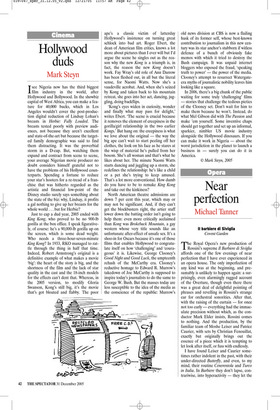Hollywood duds
Mark Steyn
Isee Nigeria now has the third biggest film industry in the world, after Hollywood and Bollywood. In the showbiz capital of West Africa, you can make a feature for 40,000 bucks, which in Los Angeles wouldn’t cover the post-production digital reduction of Lindsay Lohan’s breasts in Herbie: Fully Loaded. The breasts tested poorly with preview audiences, not because they aren’t excellent and state-of-the-art but because the targeted family demographic was said to find them distracting. It was the proverbial storm in a D-cup. But, watching them expand and contract from scene to scene, your average Nigerian movie producer no doubt considers himself grateful not to have the problems of his Hollywood counterparts. Spending a fortune to reduce your star’s hooters for a re-tread of a franchise that was hitherto regarded as the artistic and financial low-point of the Disney studio surely says something about the state of the biz: why, Lindsay, it profits a gal nothing to give up her breasts for the whole world ... but for Herbie?
Just to cap a dud year, 2005 ended with King Kong, who proved to be no 900-lb gorilla at the box office. I speak figuratively, of course: he’s a 90,000-lb gorilla up on the screen, which is some dead weight. Who needs a three-hour-seven-minute King Kong? In 1933, RKO managed to rattle through the thing in half that time. Indeed, Robert Armstrong’s original is a definitive example of what makes a movie ‘big’: the heart of the story is big, and the shortness of the film and the lack of star quality in the cast and the 18-inch models for the effects can’t dent that. Whereas, in the 2005 version, to modify Gloria Swanson, Kong’s still big, it’s the movie that’s got bloated and flabby. The poor ape’s a classic victim of latterday Hollywood’s insistence on turning great schlock into bad art. Roger Ebert, the dean of American film critics, knows a lot more about pictures than I ever will but I’d argue the scene he singles out as the reason why the new Kong is a triumph is, in fact, the reason the new Kong doesn’t work. Fay Wray’s old role of Ann Darrow has been fleshed out, in all but the literal sense, for Naomi Watts. Now she’s a vaudeville acrobat. And, when she’s seized by Kong and taken back to his mountain retreat, she goes into her act, dancing, juggling, doing backflips.
‘Kong’s eyes widen in curiosity, wonder and finally what may pass for delight,’ writes Ebert. ‘The scene is crucial because it removes the element of creepiness in the gorilla/girl relationship in the two earlier Kongs.’ But hang on: the creepiness is what we love about the original — the way the big ape can’t wait to start peeling off her clothes, the look on his face as he stares at the wisp of material he’s pulled from her bosom. She’s all woman and that’s what he likes about her. The minute Naomi Watts starts dancing and juggling up a storm, she redefines the relationship: he’s like a child or a pet she’s trying to keep amused. That’s a lot more conventional. How dumb do you have to be to remake King Kong and take out the kinkiness?
North American theatre admissions are down 7 per cent this year, which may or may not be significant. And, if they can’t get the blockbusters right, the artier stuff lower down the batting order isn’t going to help them: even more critically acclaimed than Kong was Brokeback Mountain, a gay western whose very title sounds like an unfortunate after-effect of unsafe sex. It’s a shoo-in for Oscars because it’s one of those films that enables Hollywood to congratulate itself on how ‘challenging’ and ‘courageous’ it is. Likewise, George Clooney’s Good Night and Good Luck, the umpteenth rehash of the McCarthy era. Clooney’s reductive homage to Edward R. Murrow’s takedown of Joe McCarthy is supposed to inspire today’s journalists to do the same to George W. Bush. But the masses today are less susceptible to the idea of the media as the conscience of the republic: Murrow’s old news division at CBS is now a flailing husk of its former self, whose best-known contribution to journalism in this new century was its star anchor’s stubborn if witless defence of a bunch of obviously fake memos with which it tried to destroy the Bush campaign. It was unpaid internet bloggers who exposed the fraud, ‘speaking truth to power’ — the power of the media. Clooney’s attempt to resurrect Watergateera myths of journalistic nobility leaves him looking like a square.
In 2006, there’s a big chunk of the public waiting for some truly ‘challenging’ films — stories that challenge the tedious pieties of the Clooney set. Don’t wait for him to make them because he won’t. Instead, do what Mel Gibson did with The Passion and make ’em yourself. Some inventive chaps should get together and set up an informal, sparkier, nimbler US movie industry alongside the Hollywood dinosaurs. If you can make it work in Nigeria — about the worst jurisdiction in the planet to launch a business in — surely you can do it in America.
© Mark Steyn, 2005

















































 Previous page
Previous page